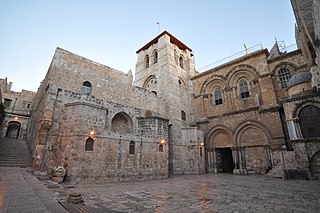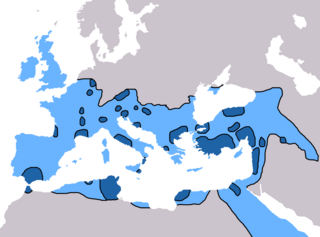
Christianity is an Abrahamic monotheistic religion based on the life and teachings of Jesus of Nazareth. It is the world's largest and most widespread religion with roughly 2.4 billion followers representing one-third of the global population. Its adherents, known as Christians, are estimated to make up a majority of the population in 157 countries and territories. They believe that Jesus is the Son of God, whose coming as the Messiah was prophesied in the Hebrew Bible and chronicled in the New Testament.

The Coptic Orthodox Church, also known as the Coptic Orthodox Patriarchate of Alexandria, is an Oriental Orthodox Christian church based in Egypt, serving Africa and the Middle East. The head of the church and the See of Alexandria is the Pope of Alexandria on the Holy Apostolic See of Saint Mark, who also carries the title of Father of fathers, Shepherd of shepherds, Ecumenical Judge and the 13th among the Apostles. The See of Alexandria is titular. The Coptic Pope presides from Saint Mark's Coptic Orthodox Cathedral in the Abbassia District in Cairo. The church follows the Coptic Rite for its liturgy, prayer and devotional patrimony. Christians in Egypt total about four million people, and Coptic Christians make up Egypt's largest and most significant minority population, and the largest population of Christians in the Middle East.
An ecumenical council, also called general council, is a meeting of bishops and other church authorities to consider and rule on questions of Christian doctrine, administration, discipline, and other matters in which those entitled to vote are convoked from the whole world (oikoumene) and which secures the approbation of the whole Church.

The Eastern Orthodox Church, also called the Orthodox Church and officially the Orthodox Catholic Church, is the second-largest Christian church, with approximately 220 million baptised members. It operates as a communion of autocephalous churches, each governed by its bishops via local synods. The church has no central doctrinal or governmental authority analogous to the head of the Catholic Church—the pope, although the Ecumenical Patriarch of Constantinople is recognised by them as primus inter pares. As one of the oldest surviving religious institutions in the world, the Eastern Orthodox Church has played a prominent role in the history and culture of Western Asia, the Caucasus, and Eastern and Southeastern Europe.

The World Council of Churches (WCC) is a worldwide Christian inter-church organization founded in 1948 to work for the cause of ecumenism. Its full members today include the Assyrian Church of the East, the Oriental Orthodox Churches, most jurisdictions of the Eastern Orthodox Church, the Old Catholic Church, the Lutheran churches, the Anglican Communion, the Mennonite churches, the Methodist churches, the Moravian Church, Mar Thoma Syrian Church and the Reformed churches, as well as the Baptist World Alliance and Pentecostal churches. Notably, the Catholic Church is not a full member, although it sends delegates to meetings who have observer status.

Ecumenism – also called interdenominationalism, transdenominationalism, or ecumenicalism – is the concept and principle that Christians who belong to different Christian denominations should work together to develop closer relationships among their churches and promote Christian unity. The adjective ecumenical is thus applied to any interdenominational initiative that encourages greater cooperation and union among Christian denominations and churches.
The East–West Schism, also known as the Great Schism or Schism of 1054, is the ongoing break of communion between the Roman Catholic and Eastern Orthodox churches since 1054. It is estimated that, immediately following the beginning of the schism, a slim majority of Christians worldwide were Eastern Christians; most of the rest were Western Christians. A series of ecclesiastical differences and theological disputes between the Greek East and Latin West preceded the formal split that occurred in 1054. Prominent among these were the procession of the Holy Spirit (Filioque), whether leavened or unleavened bread should be used in the Eucharist, the Pope's claim to universal jurisdiction, and the place of the See of Constantinople in relation to the pentarchy.
The infallibility of the Church is the belief that the Holy Spirit preserves the Christian Church from errors that would contradict its essential doctrines. It is related to, but not the same as, indefectibility, that is, "she remains and will remain the Institution of Salvation, founded by Christ, until the end of the world." The doctrine of infallibility is premised on the authority Jesus granted to the apostles to "bind and loose" and in particular the promises to Peter in regard to papal infallibility.
Miaphysitism is the Christological doctrine that holds Jesus, the "Incarnate Word, is fully divine and fully human, in one 'nature' (physis)." It is a position held by the Oriental Orthodox Churches and differs from the Chalcedonian position that Jesus is one "person" in two "natures", a divine nature and a human nature (Dyophysitism).

Eastern Orthodoxy, otherwise known as Eastern Orthodox Christianity or Byzantine Christianity, is one of the three main branches of Chalcedonian Christianity, alongside Roman Catholicism and Protestantism. Like the Pentarchy of the first millennium, the mainstream Eastern Orthodox Church is organised into autocephalous churches independent from each other. In the 21st century, the number of mainstream autocephalous churches is seventeen; there also exist autocephalous churches unrecognized by those mainstream ones. Autocephalous churches choose their own primate. Autocephalous churches can have jurisdiction (authority) over other churches, some of which have the status of "autonomous" which means they have more autonomy than simple eparchies.
Churches Together in Britain and Ireland (CTBI) is an ecumenical organisation. The members include most of the major churches in England, Scotland, Wales and Ireland. CTBI is registered at Companies House with number 05661787. Its office is in Central London. As of 2022 the General Secretary is Nicola Brady, who succeeded Bob Fyffe.
The history of the Eastern Orthodox Church is the formation, events, and transformation of the Eastern Orthodox Church through time. According to the Eastern Orthodox tradition, the history of the Eastern Orthodox Church is traced back to Jesus Christ and the Apostles. The Apostles appointed successors, known as bishops, and they in turn appointed other bishops in a process known as Apostolic succession. Over time, five Patriarchates were established to organize the Christian world, and four of these ancient patriarchates remain Orthodox today. Orthodox Christianity reached its present form in late antiquity, when the ecumenical councils were held, doctrinal disputes were resolved, the Fathers of the Church lived and wrote, and Orthodox worship practices settled into their permanent form.
The Four Marks of the Church, also known as the Attributes of the Church, describes four distinctive adjectives of traditional Christian ecclesiology as expressed in the Niceno-Constantinopolitan Creed completed at the First Council of Constantinople in AD 381: "[We believe] in one, holy, catholic, and apostolic Church."

In the history of Christianity, the first seven ecumenical councils include the following: the First Council of Nicaea in 325, the First Council of Constantinople in 381, the Council of Ephesus in 431, the Council of Chalcedon in 451, the Second Council of Constantinople in 553, the Third Council of Constantinople from 680–681 and finally, the Second Council of Nicaea in 787. All of the seven councils were convened in modern-day Turkey.

The Oriental Orthodox Churches are Eastern Christian churches adhering to Miaphysite Christology, with approximately 60 million members worldwide. The Oriental Orthodox Churches are part of the Nicene Christian tradition, and represent one of its oldest branches.

In the 5th century in Christianity, there were many developments which led to further fracturing of the State church of the Roman Empire. Emperor Theodosius II called two synods in Ephesus, one in 431 and one in 449, that addressed the teachings of Patriarch of Constantinople Nestorius and similar teachings. Nestorius had taught that Christ's divine and human nature were distinct persons, and hence Mary was the mother of Christ but not the mother of God. The Council rejected Nestorius' view causing many churches, centered on the School of Edessa, to a Nestorian break with the imperial church. Persecuted within the Roman Empire, many Nestorians fled to Persia and joined the Sassanid Church thereby making it a center of Nestorianism. By the end of the 5th century, the global Christian population was estimated at 10-11 million. In 451 the Council of Chalcedon was held to clarify the issue further. The council ultimately stated that Christ's divine and human nature were separate but both part of a single entity, a viewpoint rejected by many churches who called themselves miaphysites. The resulting schism created a communion of churches, including the Armenian, Syrian, and Egyptian churches, that is today known as Oriental Orthodoxy. In spite of these schisms, however, the imperial church still came to represent the majority of Christians within the Roman Empire.
The history of Eastern Orthodox Christian theology begins with the life of Jesus and the forming of the Christian Church. Major events include the Chalcedonian schism of 451 with the Oriental Orthodox miaphysites, the Iconoclast controversy of the 8th and 9th centuries, the Photian schism (863-867), the Great Schism between East and West, and the Hesychast controversy. The period after the end of the Second World War in 1945 saw a re-engagement with the Greek, and more recently Syriac Fathers that included a rediscovery of the theological works of St. Gregory Palamas, which has resulted in a renewal of Orthodox theology in the 20th and 21st centuries.







